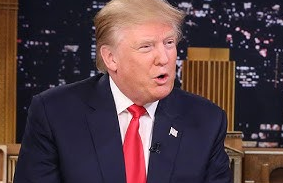Article text:
The political resurgence of President-elect Donald Trump has sent shockwaves through the Democratic Party and left Hollywood reeling. Once a dominant force in shaping cultural narratives, late-night television has emerged as another casualty of Trump’s return to political prominence. Shows hosted by Stephen Colbert, Jimmy Kimmel, and Jimmy Fallon are not only suffering from plummeting ratings but are losing the cultural relevance they once commanded.
According to a study conducted by the Media Research Center during the height of the 2024 election season, late-night comedians focused almost exclusively on mocking Trump. Between September 3 and October 25, these shows delivered approximately 1,463 jokes about Trump and Kamala Harris. Unsurprisingly, 98 percent of these jokes targeted Trump. Meanwhile, vice presidential candidate JD Vance became the punchline for 78 percent of jokes aimed at running mates.
The relentless focus on Trump hasn’t resonated with audiences, as the sharp decline in viewership suggests. Many see this as a symptom of what some call “Trump Derangement Syndrome,” where content centered on anti-Trump rhetoric has failed to connect with everyday Americans. Viewers have increasingly tuned out, leaving once-popular shows struggling to maintain their grip on late-night dominance.
The Democrats’ post-election fallout only adds to the story. Leaderless and lacking a strong contender to fill the void, the party’s struggles mirror the challenges faced by Hollywood elites. Despite promises from outspoken celebrities like Alec Baldwin and Cher to move to Canada if Trump won, their vows remain unfulfilled, adding a touch of irony to the political drama.
The decline of late-night television underscores a larger cultural shift. With Trump returning to the political stage, the landscape of media and entertainment continues to evolve. Late-night comedy may need to pivot away from polarizing narratives if it hopes to regain its footing in an increasingly fractured media environment.
The political resurgence of President-elect Donald Trump has sent shockwaves through the Democratic Party and left Hollywood reeling. Once a dominant force in shaping cultural narratives, late-night television has emerged as another casualty of Trump’s return to political prominence. Shows hosted by Stephen Colbert, Jimmy Kimmel, and Jimmy Fallon are not only suffering from plummeting ratings but are losing the cultural relevance they once commanded.
According to a study conducted by the Media Research Center during the height of the 2024 election season, late-night comedians focused almost exclusively on mocking Trump. Between September 3 and October 25, these shows delivered approximately 1,463 jokes about Trump and Kamala Harris. Unsurprisingly, 98 percent of these jokes targeted Trump. Meanwhile, vice presidential candidate JD Vance became the punchline for 78 percent of jokes aimed at running mates.
The relentless focus on Trump hasn’t resonated with audiences, as the sharp decline in viewership suggests. Many see this as a symptom of what some call “Trump Derangement Syndrome,” where content centered on anti-Trump rhetoric has failed to connect with everyday Americans. Viewers have increasingly tuned out, leaving once-popular shows struggling to maintain their grip on late-night dominance.
The Democrats’ post-election fallout only adds to the story. Leaderless and lacking a strong contender to fill the void, the party’s struggles mirror the challenges faced by Hollywood elites. Despite promises from outspoken celebrities like Alec Baldwin and Cher to move to Canada if Trump won, their vows remain unfulfilled, adding a touch of irony to the political drama.
The decline of late-night television underscores a larger cultural shift. With Trump returning to the political stage, the landscape of media and entertainment continues to evolve. Late-night comedy may need to pivot away from polarizing narratives if it hopes to regain its footing in an increasingly fractured media environment.





















